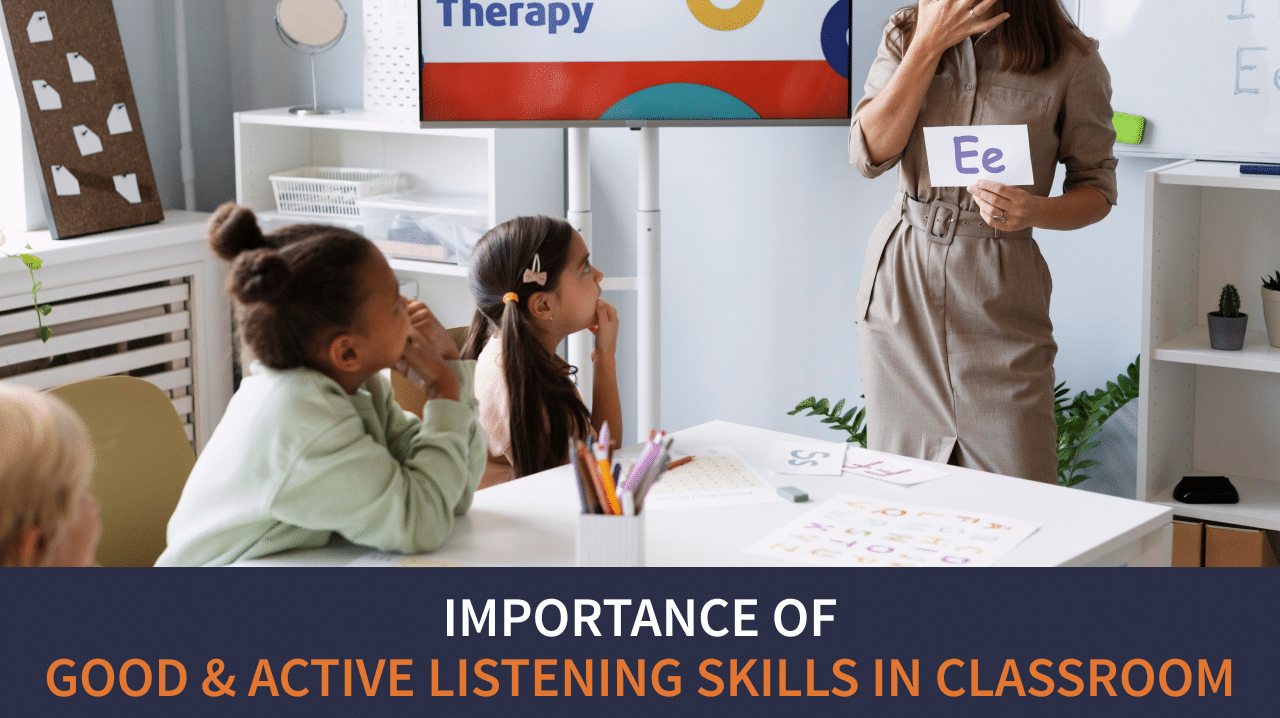Importance of Good & Active Listening Skills In Classroom

Importance of Good & Active Listening Skills In Classroom
Effective listening skills are a fundamental component of the educational landscape, especially within the classroom.
The ability to listen attentively and thoughtfully is not merely a passive act; it is an active engagement with the learning process.
In this article, we will discuss the substantial importance of proficient and active listening in an academic context.
What Is Active Listening Skills?
Active listening is a critical communication skill characterized by giving undivided attention when someone speaks. It goes beyond mere hearing; active listening involves focused engagement, such as maintaining eye contact, nodding, and asking clarifying questions.
Within the classroom environment, active listening is a fundamental skill that facilitates effective communication, enhances student-teacher rapport, and encourages shared understanding.
Types of Listening Skills
Listening skills can be categorized into several types, each serving a unique purpose in communication and understanding. Here are some common types of listening skills:
- Active Listening
Engaging with teachers and peers, using cues like eye contact and feedback.
- Reflective Listening
Paraphrasing to confirm understanding and show empathy in discussions.
- Empathetic Listening
Understanding emotions and perspectives, connecting emotionally.
- Critical Listening
Evaluating information’s credibility and validity for informed learning.
- Informational Listening
Focusing on gathering facts common in academic and instructional settings.
- Appreciative Listening
Enjoying and appreciating content, often in lectures or discussions.
- Discriminative Listening
Distinguishing different tones is vital in language learning and non-verbal cues.
- Strategic Listening
Aiming to achieve specific learning goals vital for focused education.
- Nonverbal Listening
Observing body language and gestures for deeper understanding. These skills enhance learning and relationships in educational settings.
Also Read:
> Will Reading Skills Enhance My Child’s Communication Skills?
> How To Speak English Confidently.
> How to Communicate Effective With Children.
5 Active Listening Techniques for Students
Active listening is a vital skill for students to succeed in the classroom. Here are five listening techniques to help students improve:
- Maintain Eye Contact
Encourage students to establish and maintain eye contact with the speaker, be it the teacher or a fellow student. This not only demonstrates their attentiveness but also assists them in concentrating on the speaker’s words.
- Ask Thoughtful Questions
Empower students to pose questions for clarification or to delve deeper into a topic. Active participation through asking relevant questions not only boosts their comprehension but also fosters a more engaging learning environment.
- Paraphrase and Summarize
Encourage students to rephrase what they’ve heard in their own words or to provide concise summaries of key points. This practice not only confirms their understanding but also reinforces the material.
- Eliminate Distractions
Advocate for the minimization of distractions during study or class time. Students can benefit from turning off electronic devices, stowing unrelated materials, and finding a quiet, conducive environment for learning.
- Effective Note-Taking
Teach students effective note-taking techniques. Encourage them to jot down essential concepts, keywords, or ideas during lectures or discussions. This active note-taking not only helps them remain engaged but also provides valuable reference material for later review.
Speaking and Listening Activities In The Classroom
Developing effective listening skills in the classroom is crucial for academic success. Here are some speaking and listening activities that teachers can incorporate to help students enhance their listening abilities:
- Storytelling
To develop good listening skills, encourage students to take turns telling short stories to the class. Their peers should listen carefully and then summarize or ask questions about the story afterwards. This activity improves listening and comprehension. –
Related Resources:
> 5 Interesting and Playful Storytelling Ideas for Kids!
> Motivational Stories in English For Students
- Group Discussions
Organize group discussions or debates on various topics. Assign roles such as speaker and active listener within each group. Afterwards, have the listeners summarize what the speakers said. This promotes active listening and critical thinking.
Related Resources:
> Group Discussion Topics & Tips For Students
- Listening Quizzes
Play audio recordings or videos related to the lesson’s topic to help students develop good listening skills. Afterwards, give students quizzes or ask them to discuss what they heard. This activity helps them practice listening to diverse sources.
Related Resources:
> 5 Engaging Maths Riddles With Answers For Students
> Best General Knowledge Q&A For Kids
- Read-Aloud Sessions
Have students take turns reading passages or paragraphs from a textbook or storybook. Their classmates should listen carefully and then ask questions to check comprehension. This encourages focused listening and encourages participation.
- Role-Playing
Engage students in role-playing scenarios where they must listen and respond accordingly. For instance, simulate a customer service interaction or a job interview. This activity honed listening and communication skills.
- Pair Listening
Pair students and give each pair a specific task, such as solving a problem or answering questions based on an audio recording. This fosters cooperation and attentive listening.
- TED Talks or Podcasts
Use short TED Talks or podcasts related to the subject matter. Students can listen and then share their thoughts, summarize key points, or discuss the implications of what they heard.
Conclusion
The significance of good and active listening skills in the classroom cannot be overstated. These skills foster an environment of effective communication, enhance comprehension, and empower students to actively engage in discussions and learning processes.
By honing these skills, students not only excel academically but also develop essential life skills. At MIT Gurukul, we prioritize these skills, offering interactive learning and holistic growth opportunities. Join us for a well-rounded education

